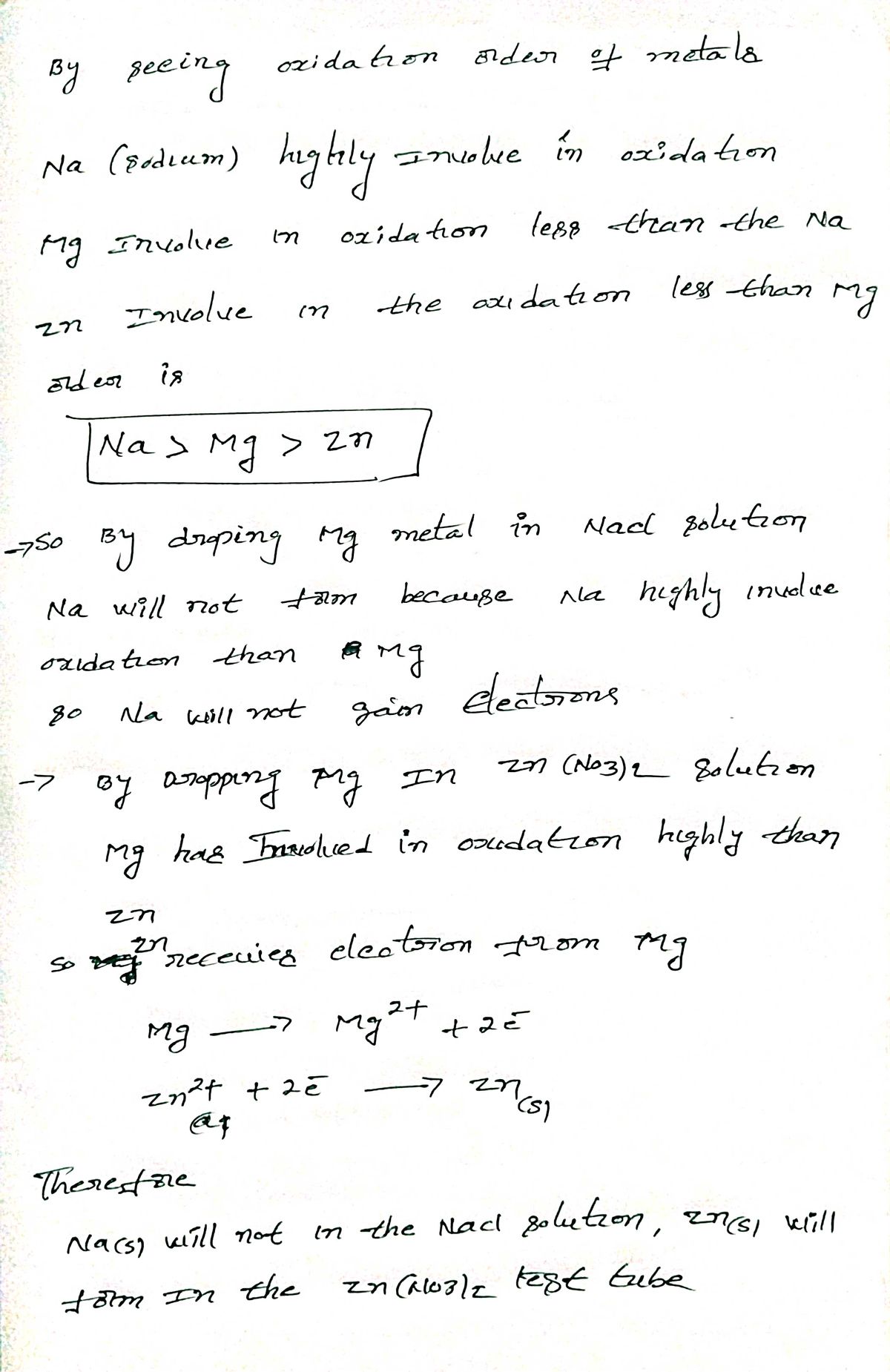into each of two test tubes: one containing a solution of NaCl(aq) and the other containing a solution of Zn(NO3)2(aq). What metals, if any, will form as a result? Na(s) will not form in the NaCl test tube, Zn(s) will form in the Zn(NO3)2 test tube. Na(s) will form in the NaCl test tube, and Zn(s) will not form in the Zn(NO3)2 test tube. Na(s) will form in the NaCl test tube, and Zn(s) will form in the Zn(NO3)2 test tube. Zn(s) will form in the NaCl test tube, and Na(s) will form in the Zn(NO3)2 test tube. Na(s) will not form in the NaCl test tube, and Zn(s) will not form in the Zn(NO3)2 test tube.
into each of two test tubes: one containing a solution of NaCl(aq) and the other containing a solution of Zn(NO3)2(aq). What metals, if any, will form as a result? Na(s) will not form in the NaCl test tube, Zn(s) will form in the Zn(NO3)2 test tube. Na(s) will form in the NaCl test tube, and Zn(s) will not form in the Zn(NO3)2 test tube. Na(s) will form in the NaCl test tube, and Zn(s) will form in the Zn(NO3)2 test tube. Zn(s) will form in the NaCl test tube, and Na(s) will form in the Zn(NO3)2 test tube. Na(s) will not form in the NaCl test tube, and Zn(s) will not form in the Zn(NO3)2 test tube.
Chemistry
10th Edition
ISBN:9781305957404
Author:Steven S. Zumdahl, Susan A. Zumdahl, Donald J. DeCoste
Publisher:Steven S. Zumdahl, Susan A. Zumdahl, Donald J. DeCoste
Chapter1: Chemical Foundations
Section: Chapter Questions
Problem 1RQ: Define and explain the differences between the following terms. a. law and theory b. theory and...
Related questions
Question

Transcribed Image Text:Question: A small amount of magnesium is dropped into each of two test tubes: one
containing a solution of NaCl(aq) and the other containing a solution of
Zn(NO3)2(aq). What metals, if any, will form as a result?
Na(s) will not form in the NaCl test tube, Zn(s) will form in the Zn(NO3)2 test
tube.
Na(s) will form in the NaCl test tube, and Zn(s) will not form in the Zn(NO3)2 test
tube.
Na(s) will form in the NaCl test tube, and Zn(s) will form in the Zn(NO3)2 test
tube.
Zn(s) will form in the NaCl test tube, and Na(s) will form in the Zn(NO3)2 test
tube.
Na(s) will not form in the NaCl test tube, and Zn(s) will not form in the Zn(NO3)2
test tube.

Transcribed Image Text:Listed in order of ease of oxidation, with the highest ease of oxidation at the top
Metal
Oxidation Reaction
Lithium
Li(s)→Li+ (aq) + e-
Potassium
K(s)→K+ (aq) + e
Barium
Ba(s)→Ba²+ (aq) + 2 e¯
Calcium
Ca(s)
Ca²+ (aq) + 2 e¯
Sodium
Na(s) Na+ (aq) + e¯
1
Mg(s)→→Mg2+ (aq) + 2 e¯
Magnesium
Aluminum
Manganese
Zinc
Chromium
Iron
Cobalt
Nickel
Tin
Lead
Hydrogen
Copper
Silver
Mercury
Platinum
Gold
Al(s)→A13+
(aq) + 3e-
Mn(s)→→Mn²+ (aq) + 2 e¯
Zn(s) → Zn²+ (aq) + 2 e¯
Cr(s)→Cr³+ (aq) + 3 e¯
Fe(s)→Fe²+ (aq) + 2 e¯
Co(s) Co²+ (aq) + 2 e-
Ni(s)→Ni²+ (aq) + 2 e-
Sn(s)→Sn²+ (aq) + 2 e¯
Pb(s)→Pb²+ (aq) + 2e7
2+
H₂(g) →→2H+ (aq) + 2 e¯
Cu(s) Cu2+ (aq) + 2 e-
Ag(s)→Ag+ (aq) + e¯
2+
Hg(1)→Hg²+ (aq) + 2 e¯
Pt(s)→Pt²+ (aq) + 2e¯
Au(s) 3+ (aq) + 3 e¯
Expert Solution
Step 1

Step by step
Solved in 2 steps with 2 images

Knowledge Booster
Learn more about
Need a deep-dive on the concept behind this application? Look no further. Learn more about this topic, chemistry and related others by exploring similar questions and additional content below.Recommended textbooks for you

Chemistry
Chemistry
ISBN:
9781305957404
Author:
Steven S. Zumdahl, Susan A. Zumdahl, Donald J. DeCoste
Publisher:
Cengage Learning

Chemistry
Chemistry
ISBN:
9781259911156
Author:
Raymond Chang Dr., Jason Overby Professor
Publisher:
McGraw-Hill Education

Principles of Instrumental Analysis
Chemistry
ISBN:
9781305577213
Author:
Douglas A. Skoog, F. James Holler, Stanley R. Crouch
Publisher:
Cengage Learning

Chemistry
Chemistry
ISBN:
9781305957404
Author:
Steven S. Zumdahl, Susan A. Zumdahl, Donald J. DeCoste
Publisher:
Cengage Learning

Chemistry
Chemistry
ISBN:
9781259911156
Author:
Raymond Chang Dr., Jason Overby Professor
Publisher:
McGraw-Hill Education

Principles of Instrumental Analysis
Chemistry
ISBN:
9781305577213
Author:
Douglas A. Skoog, F. James Holler, Stanley R. Crouch
Publisher:
Cengage Learning

Organic Chemistry
Chemistry
ISBN:
9780078021558
Author:
Janice Gorzynski Smith Dr.
Publisher:
McGraw-Hill Education

Chemistry: Principles and Reactions
Chemistry
ISBN:
9781305079373
Author:
William L. Masterton, Cecile N. Hurley
Publisher:
Cengage Learning

Elementary Principles of Chemical Processes, Bind…
Chemistry
ISBN:
9781118431221
Author:
Richard M. Felder, Ronald W. Rousseau, Lisa G. Bullard
Publisher:
WILEY